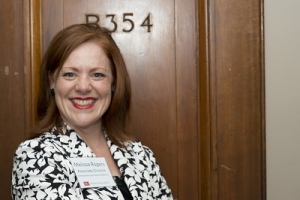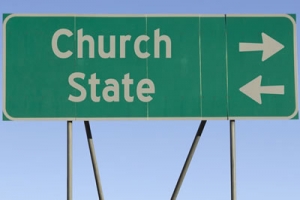Weekly Policy Report
by Edwina Rogers
Nine US Agencies Propose Regulations To Curtail Discrimination By Faith Based Organizations With Tax Payer Funds – SPI Comments
 Melissa Rogers, the Director of the White House Office of Faith-Based and Neighborhood Partnerships announced on August 5, 2015, that the Obama Administration is taking an important step toward common-ground reforms that  strengthen the partnerships the federal government forms with faith-based and community organizations for the purpose of serving people in need.  Nine federal agencies issued notices of proposed rulemaking (NPRMs) on August 5th that would clarify rules that apply to partnerships between the government and faith based organizations and extend added protections for social service beneficiaries.
Melissa Rogers, the Director of the White House Office of Faith-Based and Neighborhood Partnerships announced on August 5, 2015, that the Obama Administration is taking an important step toward common-ground reforms that  strengthen the partnerships the federal government forms with faith-based and community organizations for the purpose of serving people in need.  Nine federal agencies issued notices of proposed rulemaking (NPRMs) on August 5th that would clarify rules that apply to partnerships between the government and faith based organizations and extend added protections for social service beneficiaries.
Ms. Rogers formerly served as Director of the Center for Religion and Public Affairs at Wake Forest University Divinity School (no longer operating) and as a nonresident Senior Fellow in the Governance Studies program of The Brookings Institution. Prior, Rogers was the Executive Director of the Pew Forum on Religion and Public Life and General Counsel of the Baptist Joint Committee for Religious Liberty. In 2008 Baylor University Press published a casebook co-authored by Rogers, Religious Freedom and the Supreme Court. In 2009 President Barack Obama appointed Rogers to serve as Chair of his inaugural Advisory Council on Faith-Based and Neighborhood Partnerships. In 2011 she was named to a subgroup of the State DepartmentÔÇÖs Religion and Foreign Policy Working Group.
Impetus for these reforms came from a diverse Advisory Council for Faith-Based and Neighborhood Partnerships (Advisory Council).  In 2009, President Obama asked this Council to make recommendations for strengthening the social service partnerships the government forms with nongovernmental providers, including strengthening the constitutional and legal footing of these partnerships. The Advisory Council issued its recommendations in a report entitled,  A New Era of Partnerships: Report of Recommendations to the President.  I had the honor of chairing this Advisory Council before I took my job at the White House.While Council members differed on some important issues in this area, they were able come to an agreement on a number of significant recommendations
In response to the Advisory CouncilÔÇÖs recommendations, President Obama signed Executive Order 13559. ┬áThe agencies are issuing proposed rules to accomplish some of the aims of that Executive Order.┬á These policies will long withstand President ObamaÔÇÖs tenure in the White House.
The proposed rules clarify the principle that organizations offering explicitly religious activities may not subsidize those activities with direct federal financial assistance and must separate such activities in time or location from programs supported with direct federal financial assistance.  For example, if a faith-based provider offers a Bible study as well as a federally supported job training program, the Bible study must be privately funded and separated in time or location from the job training program.
The NPRMs also propose new protections for beneficiaries or prospective beneficiaries of social service programs that are supported by direct federal financial assistance.  In the proposed rules, the agencies set forth a notice to beneficiaries and prospective beneficiaries that informs them of these protections.  These notices would make it clear, for example, that beneficiaries may not be discriminated against on the basis of religion or religious belief or be required to participate in any religious activities and advises beneficiaries that they may request an alternative provider if they object to the religious character of their current provider.
At the same time, the NPRMs assure religious providers of their equal ability to compete for government funds and of continuing protections for their religious identity like the ability of providers to use religious terms in their organizational names and to include religious references in mission statements and in other organizational documents.┬á The NPRMs also state that the standards in the proposed regulations apply to sub-awards as well as prime awards, and set forth definitions of ÔÇ£directÔÇØ and ÔÇ£indirectÔÇØ federal financial assistance.┬á These areas have been sources of confusion for some providers.
The agencies are encouraging interested parties to submit comments on the proposed rules by October 5, 2015.  Once those comments have been received and analyzed, the final rules will be issued.  Separate from the rulemaking process, agencies are continuing to work toward other modifications to their guidance, practices and communications strategies consistent with the Executive Order.
For each agency’s NPRM, click on the relevant link below:
Department of Health and Human Services
Department of Homeland Security
Department of Housing and Urban Development
Department of Veterans Affairs
U.S. Agency for International Development
Sign On With SPI
 We are asking all SPI coalition members to sign on to the letter linked below.  The deadline to sign on is Wednesday, October 14, 2015.
We are asking all SPI coalition members to sign on to the letter linked below.  The deadline to sign on is Wednesday, October 14, 2015.
To join this initiative,┬áemail your group’s name to┬áedwina@secularpolicyinstitute.net┬áto be included. ┬áThe complete letter may be viewed here.
Sign On Letter to Eliminate Religious Exemptions For Vaccines
We are asking the Department of Health & Human Services to work with Congress and Governors to implement a  nationwide vaccination policy and repeal the non-medical vaccination exemptions which currently exist in 48 states.  Philosophical and religious exemptions are given subjectively to a person who claims a sincere religious belief to be exempt from vaccinations and or from vaccinating their child, reducing the overall efficacy of vaccinations and putting entire communities at risk of preventable diseases.
nationwide vaccination policy and repeal the non-medical vaccination exemptions which currently exist in 48 states.  Philosophical and religious exemptions are given subjectively to a person who claims a sincere religious belief to be exempt from vaccinations and or from vaccinating their child, reducing the overall efficacy of vaccinations and putting entire communities at risk of preventable diseases.
Sign On With SPI
We are asking all SPI coalition members to sign on to the letter linked below.  The deadline to sign on is Wednesday, October 14, 2015.
Just email your group’s name to┬áedwina@secularpolicyinstitute.net┬áto be included. ┬áView the letter in its entirety on our website.
Senate and House Update
Congressional Republicans for months ignored DemocratsÔÇÖ repeated calls to begin talks on a sweeping budget deal. But with Speaker BoehnerÔÇÖs retirement announcement, he and other lawmakers began to make clear they want to┬áraise the debt ceiling┬áand strike a┬álong-term budget accord┬ábefore his departure.
Last weekÔÇÖs vote to keep the government funded got just 91 Republican votes, with nearly 190 Democrats joining them. Any long-term deal in the Senate would require 10 Democratic votes. HereÔÇÖs what that means:
- BoehnerÔÇÖs successor will most likely factor the whims of the very conservative House Freedom Caucus into leadership efforts ÔÇô compromise will likely become much tougher.
- Stunningly, Democrats now find themselves with more leverage than before the SpeakerÔÇÖs retirement announcement.
- With Democratic votes needed in the House and Senate, Democrats become co-equal negotiating partner with the White House and Republicans.
- You can expect Democratic leadership to insist on raising budget caps by $74 billion as part of any long-term deal.
Which departments, agencies and programs would be the beneficiaries of that increase? If itÔÇÖs going to come together, it will happen┬ávery quickly, in October, before the Speaker retires.
The Senate is in a state work week next week for Columbus Day.  Then they will return on October 19th for a five week work period that ends with the Thanksgiving break.
Food for Thought
 10 percent
10 percent
Less than 10 percent of the worldÔÇÖs population will be living in extreme poverty by the end of 2015.
Source: World Bank.
India’s Deadly Food Fight
Following last weekÔÇÖs murder of a Muslim man rumored to have eaten beef, Prime Minister Narendra Modi of India said that Hindus and Muslims should work together to fight poverty, not each other, as the BBC┬áreports.
Atlantic┬ápublished a must-read piece by Krishnadev Calamur:┬áÔÇ£IndiaÔÇÖs Food Fight Turns Deadly.ÔÇØ
Women In Islam Program October 13th By The Institute Of Peace
 ISIS extremists in Iraq and Syria declare that Islamic scripture justifies their taking of refugee women as sex slaves. Men in some Muslim societies cite their religion in defending ÔÇ£honor killingsÔÇØ of women. In the West, many commentators proclaim Islam inherently sexist, and some governments ban the veils traditionally worn by many Muslim women. Amid the turmoil, a growing cohort of female Islamic scholars says Muslim women are marginalized not by the Quran but by patriarchal cultural practices and interpretations of their faith.
ISIS extremists in Iraq and Syria declare that Islamic scripture justifies their taking of refugee women as sex slaves. Men in some Muslim societies cite their religion in defending ÔÇ£honor killingsÔÇØ of women. In the West, many commentators proclaim Islam inherently sexist, and some governments ban the veils traditionally worn by many Muslim women. Amid the turmoil, a growing cohort of female Islamic scholars says Muslim women are marginalized not by the Quran but by patriarchal cultural practices and interpretations of their faith.
On┬áOctober 13, USIP will screen the recent PBS documentary ÔÇ£Gender Equality in Islam,ÔÇØ and host a┬ádiscussion┬áon how women can understand and advance the gender-egalitarian principles of the faith. ÔÇ£Gender Equality in IslamÔÇØ presents the work of Dr. Azizah el-Hibri, a longtime University of Richmond law professor and Islamic scholar who in 1993 founded┬áKaramah┬á, an organization that educates Muslim women about Quranic scripture. KaramahÔÇÖs executive director, Aisha Rahman, who is featured in the film, will join other experts to discuss the importance of education and other tools that women need to interpret and promote IslamÔÇÖs defense of womenÔÇÖs rights.
